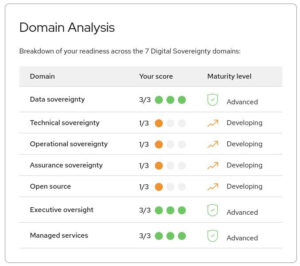Will Greece’s embrace of tech as a mover and shaker of its economy ultimately be beneficial to the country and its neighbors? Marco Fioretti examines the pros and cons.

A couple of weeks ago TechCrunch published a synthesis of an event in Athens in which Greece’s Prime Minister Kyriakos Mitsotakis explained why and how, since 2019, his government has been leading Greece towards a more modern, tech-based economy.
For context, between 2009 and 2019, Greece went through a really ugly debt crisis, and more recently its dependence on overtourism has made Greek property prices rise about 25% since 2023. Some Greek islands are now overwhelmed by tourists who don’t even use their hotels, all amid protests over low wages for tourism workers. In these conditions, modernization and diversification of the economy is crucial. The question is, will it happen in the right way?
The Good Parts
According to Mr. Mitsotakis, Greece intends to use technology “not just to catch up, but to actually do better” than other countries. On that front, it’s great to know that Greece “sidestepped some of the inflated valuations and failed ventures that are weighing down more mature ecosystems.”
Since I think that what passes for AI today is really dumb, but still avoidable, I equally appreciated the minister’s remark that all of Europe, not just Greece, must pursue the real opportunities of AI, avoiding US-inspired races to produce AI models for their own sake (and for profit), without even understanding what they do.
Personally, I’d like to believe that all this is the ministerial way of saying “we are going for AI, but without wasting tons of money to pretend we’re gods, as is customary in Silicon Valley these days.”
I also like Mitsotakis’s decision to set up a Ministry of Digital Governance with the power to gather data from all other ministries in order to deliver more effective digital services to all citizens. Too many departments of public administration worldwide seem to exist just to keep some knowledge locked.
Finally, having recently said that the EU could learn a thing or two from India’s digital policies, I’m also intrigued by Mitsotakis’s declaration that India is one of the countries with which Greece sees natural synergies, and consequently wants to “focus on.”
The Not So Good Parts
For the record, the Prime Minister also supports a European “savings and investment union” that would make it more convenient for European individuals and businesses to keep their money in Europe instead of, say, buying American stocks or bonds.
I still don’t know whether I agree or not, but I am more concerned about something else: I am quite skeptical of politicians who are only or primarily interested in tech startups, and even more skeptical when they don’t value free-as-in-freedom software and other technologies, but only see what we call “big tech.”
I feel Europe needs leaders who concretely support truly open technology and real entrepreneurs of all kinds and sizes, whose work will make them wealthy and actually make the world a better place. Based on that report and video, I’m not sure how much Mitsotakis agrees.
I say so because Mitsotakis says in the video that the vision for Greece’s technological leapfrogging includes:
- The ambition to modernize government with AI — for example, with a Microsoft-backed AI system that “slashed government contract review times from hours to minutes.”
- Wanting to have more of a startup mentality as a government.
If this sounds familiar, it’s because it is. With all due respect for Greece and its Prime Minister, those two bullet points could be words Musk would use to describe DOGE, and we all know how that can work in practice. The fact that even the event host in TechCrunch’s video finds Mitsotakis’s background “very Silicon Valleyesque” just adds to my discomfort.
Heaven knows that, on every continent, we all need something different — not just newer — than what currently passes as “innovation.” We all know we need that, even in public administrations at all levels, and we understand that digital technologies are absolutely essential to get there. But governments are not startups, and I’ll dare say that good governments must not be startups, ever.
Help me clear my doubts!
Even outside politics, what’s the point of leapfrogging if you do it to reach the same wrong place where others got stuck, only faster?
I am sure that a country like Greece — exactly because of the recent, serious hardships it had to endure — can do and teach a lot about real innovation in tech. I am sure that it’s only because I can’t read Greek that my searches about startups in Greece only returned news about “exits” and “unicorns,” and plenty of “startup-to-exit advice for founders.”.
There’s nothing wrong with that, mind you! It’s just that there seems to be little or nothing that’s specifically about Greece, which could only happen in Greece, or which solves a problem unique to Greece. Please help me find it. I’d love to write a follow-up article about Greek startups doing something unique for Greece!

Marco Fioretti is an aspiring polymath and idealist without illusions based in Rome, Italy. Marco met Linux, Free as in Freedom Software, and the Web pre-1.0 back in the ’90s while working as an ASIC/FPGA designer in Italy, Sweden, and Silicon Valley. This led to tech writing, including but not limited to hundreds of Free/Open Source tutorials. Over time, this odd combination of experiences has made Marco think way too much about the intersection of tech, ethics, and common sense, turning him into an independent scholar of “Human/digital studies” who yearns for a world with less, but much better, much more open and much more sensible tech than we have today.








Politicians don’t understand too much about tech – in the end, these speeches are based on information from policy people who (hopefully) have a deeper understanding. So somewhere, somebody knows what they are doing – hopefully the way the system is structured results in that knowledge being worked into good decisions.